Overseas Case: Max-Planck Institutes (Germany)
Exploring Careers in Academia and Beyond: Career Enhancement at the Max Planck Institutes
The Max Planck Institutes are high-ranking institutes, well known for fostering the growth of researchers in multiple streams of science, which lays the foundation for successful careers.
For this article, we interviewed Dr. Burkhardt Schmidt and Dr. Markus König from the Max Planck Institute for Chemical Physics of Solids, Dresden, Dr. Elisabeth Weir from the Max Planck Institute for Biology Tübingen, and Dr. Christiane Haupt from the Administrative Headquarters of the Max Planck Society. All four support staff members interact closely with young researchers and students at their respective institutes. They introduce their individual activities and offer insights into how they help young researchers in exploring career paths within and beyond the field of academia and research.
All institutes of the Max Planck Society act independently. Hence, the perspectives on career development activities and support offered by each of the support staff is based on the wishes and needs of the young scientists at the respective institute. Each Max Planck Institute offers its own career development measurement and certainly, there are common themes in the activities regarding career development across all Max Planck Institutes.
Abstract
The Max Planck Society is Germany’s leading research organization for basic research. Currently, there are 86 Max Planck institutes and facilities, conducting cutting-edge research in the natural sciences, life sciences, social sciences, and the humanities. A total of 4,600 PhD students and 3,700 postdocs work at the Max Planck Institutes, which are located throughout Germany and, in some cases, abroad.
What makes the Max Planck Institutes attractive to young researchers from all over the world is their open, approachable, and innovative culture, which fosters an engaging and vibrant research environment.
Career development is an important issue for the Max Planck Society, to support young researchers in making the most of their limited time at a Max Planck Institute. On the one hand, there are central offers available for all young scientists organized by the Planck Academy of the Max Planck Society. On the other hand, the individual institutes provide customized offers to their scientists.
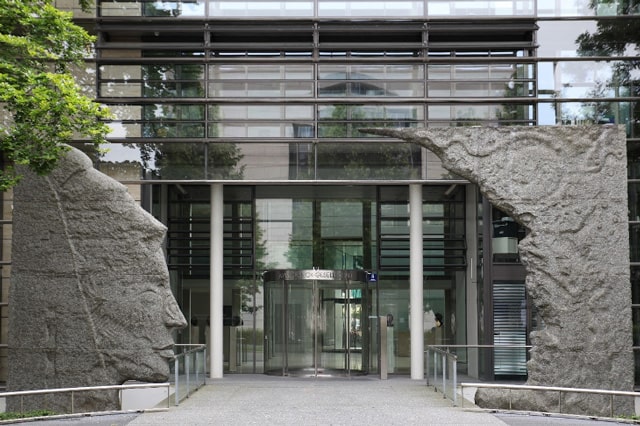
The Max Planck Society: A leading research organization in Germany (Image courtesy: Kai Weinsziehr, Max Planck Society)
Interviewees’ Bio

Dr. Burkhard Schmidt is a Staff Scientist and the PhD Officer at the Max-Planck-Institute for Chemical Physics of Solids, conducting research primarily on frustrated magnetism.

Dr. Elisabeth Weir is the Postdoc Coordinator at the Max Planck Institute for Biology, whose role is to support postdoctoral researchers in their personal and career development.

Dr. Markus König is a Staff Scientist at the Max Planck Institute for Chemical Physics of Solids. He is also the Coordinator of the International Max Planck Research School for Chemistry and Physics of Quantum Materials.
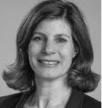
Dr. Christiane Haupt works in the Unit for International Relations at the Administrative Headquarters of the Max Planck Society, München.
The research ecosystem at the Max Planck Institutes
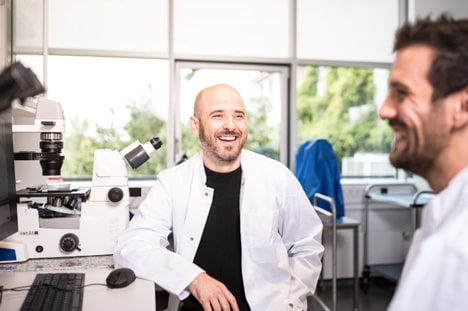
Researchers at work in a laboratory at the Department of Algal Development and Evolution, Max Planck Institute for Biology Tübingen (Image courtesy: Max Planck Society)
The Max Planck Institutes are internationally known for conducting cutting-edge research in multiple scientific fields. Thus, students and young researchers from across the world apply to work and study here.
Here, young researchers get the opportunity to work at the International Max Planck Research Schools (IMPRS). There are a total of 65 IMPRSs, which were established at individual Max Planck institutes to offer structured PhD programs together with associated universities. One of their most important goals is to support the professional development of PhD researchers.
The IMPRSs provide excellent research opportunities to PhD students and enhance their research skills. For example, young researchers from the Max Planck Institute for Chemical Physics of Solids get the opportunity to work on collaborative research projects under two supervisors—one from this Max Planck institute, and one from the collaborating university or institute.
The Max Planck Institute for Chemical Physics of Solids recruits talented PhD students from more than 20 countries, which leads to the creation of a multicultural and open learning environment.
Why is career development important at the Max Planck Institutes?
The Max Planck Institutes provide junior scientists with excellent working conditions, thus presenting optimal settings for the development of their scientific profiles. However, scientific excellence alone is not sufficient for a scientist to succeed in a highly competitive academic and non-academic job market. To support junior scientists in making the right choices early in their careers, the Max Planck Society promotes personal and career development strategies tailored to individual needs. This allows junior scientists to make the best use of their limited time in the Max Planck Society, and ideally prepares them for their next career step in or outside academia.
Overall, there is an interplay of centralized offerings by the general administration and tailored offerings by the individual institutes
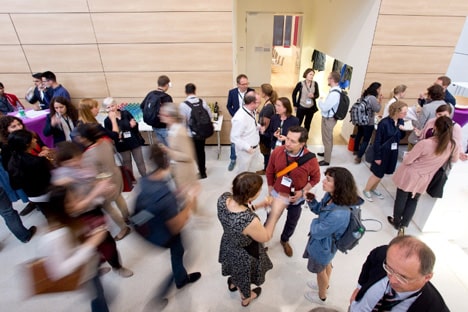
Postdocs and researchers at a Career Steps event at the Max Planck Society (Image courtesy: Judith Wallerius, Max Planck Society)
- The Planck Academy offers Max Planck-wide, target-group-specific opportunities for training and personal career development.
- Soft Skills Seminars are organized at virtually all Max Planck institutes so that young researchers can collectively learn about skills that are not related to their core scientific fields. At some institutes like the Max Planck Institute for Chemical Physics of Solids, these seminars are organized by the junior researchers themselves.
The offers at the institutes are complemented by courses offered at the Planck Academy, thus giving junior researchers access to an even larger set of training and coaching opportunities. - Minerva FemmeNet program is a special mentoring program organized by the Max Planck Society for junior female scientists. In this program, experienced female scientists mentor junior female scientists. Through networking events and meet-ups, the program fosters a safe and supportive space for female researchers to grow in their research field of interest.
- Career Steps for Postdocs is an annual career event for all postdocs, organized by the Planck Academy of the Max Planck Society in collaboration with reputed universities in Germany. During this one-day event, postdoctoral researchers get a broad overview on career opportunities within and beyond academia.
Popular career development events for young researchers at the Max Planck Institutes
To help both PhD and postdoctoral researchers, different Max Planck institutes organize career events that help researchers understand the steps to getting a new job, including application, recruitment, onboarding, training, navigating, and transfer.
At the Max Planck Institute for Chemical Physics of Solids, student representatives organize Career Development Seminars and events for young researchers to truly understand the scope of their skillset after securing their PhD and postdoctoral degrees.
The support staff encourages researchers to attend these events and interact not only with researchers who continued with a research career, but also with those who chose a different career path.
These events are designed in a way that young researchers get an idea about different career paths and understand what career is better aligned with their interests.
At the Max Planck Institute for Biology Tübingen, there is a dedicated researcher support team that offers training programs and workshops to support career development of young researchers.
The Distinguished Speaker Seminar Series is organized on a weekly basis by the Max Planck Institute for Biology Tübingen and the Friedrich Miescher Laboratory of the Max Planck Society. External guest speakers alternate with the institutes’ scientists presenting a range of exciting research. Junior researchers also get the opportunity to talk to the speakers in one-on-one meetings and discuss their research findings.
The Career Seminar Series organized by the Max Planck Institute for Biology Tübingen, offers monthly events in which life science doctoral graduates, including the institute’s alumni, are invited to speak about the different career routes they took. Talks by alumni of a similar background are especially interesting for young researchers who want to explore similar paths.
Curiositas is a seminar series at the Max Planck Institute for Chemical Physics of Solids led by the student representatives. For this event, industry and academia experts, as well as former students are invited to talk to young researchers about their experiences. They discuss interesting subjects that are not necessarily related to condensed matter research. As an example, at one event, an architect spoke about his experiences of designing a hospital that increased the safety for patients with dementia.
Listening to former students talk about their career trajectories helps current students understand that their prospects do not have to be limited to academia and research field.
Response to career development events and workshops
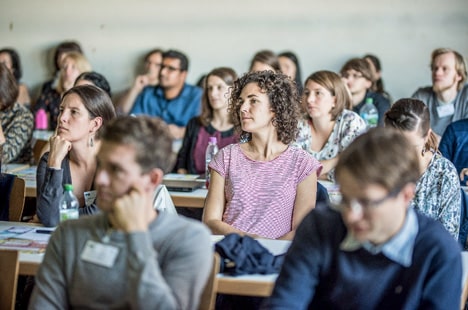
Young researchers listening to a talk at a Career Steps event (Image courtesy: Matthias Franke, Max-Planck-Society)
Most young PhD and postdoctoral researchers are very satisfied with the career development events they attend at the Max Planck Institutes. They frequently provide feedback via surveys on how these events can be improved, and help organizers understand their expectations better.
Based on these surveys, young researchers have displayed an inclination toward a few hot-topics, such as grant proposal writing, scientific writing, and alumni-talks.
How does studying at Max Planck Institutes help young researchers?
After graduation, young researchers from the Max Planck Institute for Chemical Physics of Solids can explore a variety of interesting jobs, using their newly acquired skills. For example, at one of the largest semiconductor companies in Germany, there are various well-paid positions that can be filled by PhD students from the field of physics and chemistry.
Interestingly, 10 years ago, in some fields it was less common than today to look for a career outside academia after a postdoctoral degree. The fact that heavily research-based institutes like the Max Planck Institute for Chemical Physics of Solids and the Max Planck Institute for Biology Tübingen encourage PhD and postdoctoral researchers to explore careers beyond science is a new and welcome change.
Researchers and alumni who benefitted from career development events
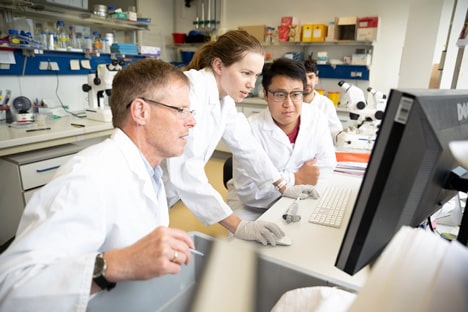
Researchers in a laboratory at the Max Planck Institute for Biology Tübingen (Image courtesy: Max-Planck-Society)
Overall, there are a large number of very successful scientists and junior researchers who attended career development events and landed jobs within and beyond academia. As an example, a former PhD student of the Max Planck Institute for Chemical Physics of Solids currently works in the automobile industry. He recently visited the institute again to deliver a talk about his career, encouraging current PhD students and postdocs to reach out for industry positions, not limited to his employer.
Young researchers from the Max Planck Institute for Biology have also gone on to have highly prestigious jobs. While it is difficult to pinpoint whether career development events were responsible for their success, it is the entire experience of studying at this institute and the career development events offered by it, that played a key role in their successful careers.
Additional initiatives to enhance doctoral and post-doctoral researchers’ career
- The Max Planck Institute for Chemical Physics of Solids will work on expanding the scope of career development events to wider ranges of topics based on the demands of the young researchers.
- At the Max Planck Institute for Biology, a symposium organized by and for postdocs is in planning. The postdoc representatives will also organize informal outings and meet-ups for young researchers. Career development workshops will cover additional themes, such as scientific communication.
Advice to young researchers
Young researchers should evaluate time and again whether they want to continue in the scientific field or in academia. If they address these questions early, they can plan their career goals better.
Young researchers and students should also formulate an alternative career plan if their primary one does not materialize. Furthermore, they should be open to choosing careers beyond academia. To this end, they can benefit a lot from attending career development seminars and events offered at the Max Planck Institutes.
Interview date: February 2022
Interview cooperation: Cactus Communications
